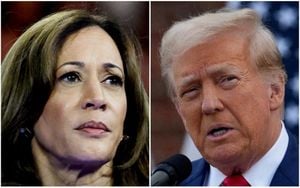Robert F. Kennedy Jr. is making waves once again, this time as he has been nominated to lead the U.S. Department of Health and Human Services by President-elect Donald Trump. Known widely for his controversial views and vaccine skepticism, Kennedy's nomination has raised alarms among health experts and politicians across the board.
During his campaign and thereafter, Kennedy has made numerous unfounded claims about vaccines, including the debunked assertion linking them to autism. His views extend beyond vaccines, encompassing conspiracy theories about Wi-Fi causing cancer and other outlandish statements. Given these beliefs, many are left wondering how he would manage the department charged with overseeing key health agencies like the Centers for Disease Control and Prevention (CDC), the National Institutes of Health (NIH), and the Food and Drug Administration (FDA).
Last year, as noted by one nursing student, the real-world impact of Kennedy's influence is palpable. A patient, coming out of surgery, refused to accept blood transfusions from vaccinated donors, driven by the fear seeded by vaccine misinformation. This incident is just one of many examples illustrating how deeply misinformation has seeped through the healthcare system.
Many health professionals worry about the effect Kennedy could have if confirmed. Massachusetts Governor Maura Healey and U.S. Representative Stephen Lynch expressed serious concerns during recent public addresses. Lynch remarked, "Having Robert Kennedy there gives me great concern," signaling the widespread unease about the potential rollback of trusted health policies.
Compounding these concerns are Kennedy's views on HIV and gender identity. He once claimed, mistakenly, about the causes of homosexuality, attributing it to endocrine disruptors rather than biological or genetic factors. His unfounded assertions also target individuals with HIV, positing the false narrative claiming the ‘gay lifestyle’ as the true cause of AIDS, rather than the HIV virus itself. Such statements could ripple through policies affecting LGBTQ+ health initiatives, which many perceive as potentially harmful.
After Kennedy’s nomination, some voices within the LGBTQ+ community shared their apprehension. Human Rights Campaign National Press Secretary Brandon Wolf emphasized the importance of leadership grounded in science, noting, “The country deserves serious leadership and has every right to demand it.” Their contention highlights the moral imperative to have leaders committed to public health and scientific integrity.
Interestingly, support for Kennedy's nomination did surface from some unexpected quarters, including Colorado's Governor Jared Polis, who lauded Kennedy for opposing vaccine mandates, even as his administration contemplates the ramifications of Kennedy's stance on various LGBTQ+ issues. Polis, reflecting on Kennedy's approach, has been criticized for seemingly endorsing harmful narratives linked to vaccine hesitancy.
Across the nation, reactions vary, but there’s wide agreement among health professionals, politicians, and community leaders about the dangers of the ideas Kennedy espouses. U.S. Senator Elizabeth Warren, who serves on the Senate Finance Committee's healthcare subcommittee, remarked on social media, stating, “RFK Jr. poses a danger to public health, scientific research, medicine, and health care coverage for millions.”
The Massachusetts congressional delegation is particularly vocal against the nomination, as individuals like Representative Katherine Clark and Senator Ed Markey join the chorus expressing concern over Kennedy's track record. “Dangerous. Unqualified. Unserious,” Markey stated emphatically on social media, underscoring fears about the erosion of scientific principles within health policy.
With such significant pushback, Kennedy's confirmation remains uncertain. There is speculation about whether Republicans will pursue unconventional options like recess appointments to bypass confirmation processes. There might be political maneuvering to secure Kennedy's role, but there is also the possibility of extensive hearings and challenges to his nomination coming from both sides of the aisle.
Overall, the potential effects of Robert F. Kennedy Jr. leading the Department of Health and Human Services extend far beyond political turf. His influence could sway health care policy on vaccines, LGBTQ+ rights, and fundamental public health initiatives. Observers both within and outside government continue to sound the alarm, echoing the sentiment shared by many: the nation deserves leadership capable of fostering trust, relying on evidence-based policies, and working closely with communities to overcome existing health crises. The echoes of apprehension resonate as Kennedy's past informs concerns about the future of public health policy and safety across the United States.



